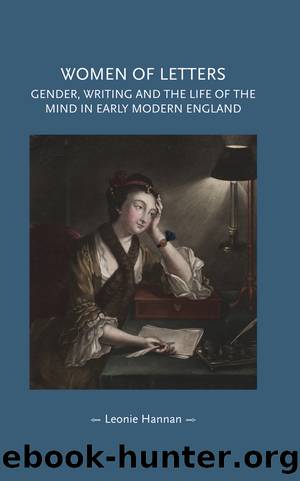Women of letters by Leonie Hannan

Author:Leonie Hannan [Hannan, Leonie]
Language: eng
Format: epub
Tags: History, Modern, 17th Century, Social Science, Women's Studies, Europe, Renaissance
ISBN: 9781784998134
Google: P3a5DwAAQBAJ
Publisher: Manchester University Press
Published: 2016-06-01T03:15:27+00:00
This comment also demonstrated that Frances Taylor expected her daughters to receive an education through the rigours of independent âbook learningâ as well as with the guidance of teachers. Despite the apparent criticisms of her daughterâs written skills and propensity to study, her letter-writing was whole-heartedly encouraged: âwe desire that you or your sister will write once a week, write every little thing that comes into your head, it will keep your hands in writing & it will give pleasure to your pappa & mamma.â13 Elizabeth Petty (c. 1636â1708/10) â wife of the natural philosopher and administrator, William Petty â encouraged her children likewise: âyu must always read yr Letters iust before yu answer ym, & yn yu will be able to answer to every particuler.â14 Writing from the family home in Dublin to her husbandâs residence in Piccadilly, London, where the children were staying, she hoped to encourage them in this habit by suggesting that âMr Banworth take Care to biy yu good Inke Paper, Penns, & wax. & yn yu will take pleasure in writeing, I wld have yu tell me every thing yu hear, & wher yu goe, & who Comes to see yu, & wt Cloths yu have, & wt yr Bro: Harry doesâ.15 Later the same month, she chided: âyr Unkle & Aunt takes it ill yt yu doe not Mention ym in yr Letters, so does yr Brother, donât forget it for ye future.â16 It seemed that the regular rebukes for not mentioning particular events or people in letters were even imitated by the young Anne Petty, who wrote a neat and polite letter to her aunt, Bridget Cadogan, but complained âI would know how all my Cousen does, for you never spake of them me thinks if you spake of none elce you should of little Cousen Lopyâ.17 Alongside criticism, the Petty children did receive some positive encouragement about their epistolary style, their mother commenting: âI Likt yr Last Letter very well becaus it gave me an acco[un]t. of many particulers.â18
The fact of writing letters, and gaining practice at doing so, appeared to be paramount. These mothersâ statements reveal an emphasis on attaining the habit of writing letters over and above any need to communicate a particular message. An indication of the Taylorsâ privileged position in society was the implicit understanding that the cost of postage was an affordable and acceptable expense even for practice letters of little communicative value. Likewise, the Petty family encouraged a regular traffic of letters between their homes in Dublin and London, both to keep in touch with their children and also to educate them in this important social practice. These examples show correspondence was used as an explicitly educational exercise for girls and young women, and one that paved the way to adult competence in social life. Similar evidence is detectable in family correspondences across England. A small, stitched exercise book belonging to Henry Shirley of the Manor House at Brailsford in Derbyshire dedicated half its pages
Download
This site does not store any files on its server. We only index and link to content provided by other sites. Please contact the content providers to delete copyright contents if any and email us, we'll remove relevant links or contents immediately.
Women and Jewish Marriage Negotiations in Early Modern Italy by Howard Tzvi Adelman(460)
Warrior King by Wilbur Smith(425)
The Battle of Austerlitz by 50minutes(316)
18 real-life stories of serial killers and murderers with solved and unsolved killings from the USA, UK, Europe, and beyond. by Ben Oakley(313)
Youth, Heroism and War Propaganda: Britain and the Young Maritime Hero, 1745â1820 by D. A. B. Ronald(306)
Violence and Emotions in Early Modern Europe by Susan Broomhall;Sarah Finn;(305)
Who's Who in the Zulu War, 1879: The British by Adrian Greaves Ian Knight(303)
The American Crisis by Unknown(298)
The Seeker by S. G. MacLean(251)
The Origins of French Absolutism, 1598-1661 by Alan James(247)
The Dutch East India Company and British East India Company: The History and Legacy of the Worldâs Most Famous Colonial Trade Companies by Charles River Editors(238)
The Traitor of Colditz by Robert Verkaik(234)
The Thirty Years War â Complete by Friedrich Schiller(227)
A Genius for Confusion by Richard M. Fried(224)
Fires of Faith by Catholic England under Mary Tudor(224)
Interest and Connection in the Eighteenth Century by Jacob Sider Jost(221)
The Slave Trade in Africa by Simon Webb;(220)
Invisible Worlds by Peter Marshall(219)
The Opium Wars: Exploring the Addiction of Empires from Beginning to End by Ramos Adrian & Compacted History(216)
